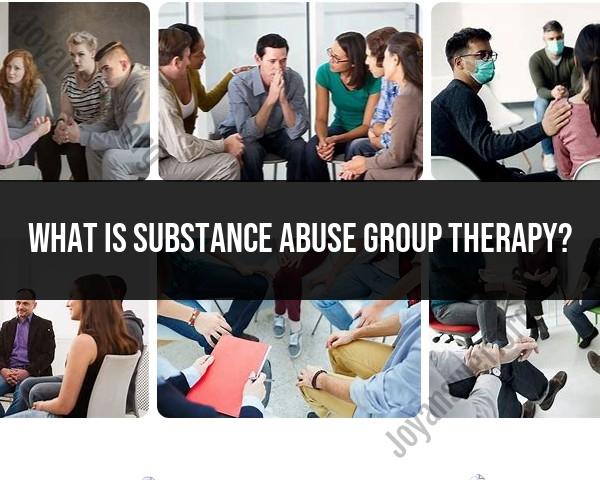What is substance abuse group therapy?
Substance abuse group therapy is a form of therapeutic intervention designed to help individuals struggling with substance abuse and addiction. It involves a group of individuals who come together to share their experiences, discuss common challenges, and work towards recovery under the guidance of a trained therapist or counselor. The primary goal of substance abuse group therapy is to provide support, encouragement, and a sense of community for individuals facing similar issues.
Here are key components and features of substance abuse group therapy:
Group Setting: Sessions typically involve a small group of individuals, led by one or more therapists. The group dynamic is essential for fostering mutual support and understanding.
Therapeutic Facilitation: A trained therapist or counselor facilitates the group sessions, guiding discussions, and ensuring a safe and supportive environment. The therapist may use various therapeutic approaches, such as cognitive-behavioral therapy, motivational interviewing, or dialectical behavior therapy.
Peer Support: Group therapy emphasizes the power of peer support. Participants share their personal experiences, challenges, and successes, providing empathy and understanding to one another. Peer support helps reduce feelings of isolation and shame often associated with substance abuse.
Education: Group therapy sessions often include educational components where participants learn about addiction, coping strategies, relapse prevention, and other relevant topics. Psychoeducation is a key aspect of helping individuals understand the nature of their struggles and the path to recovery.
Skill-Building: Participants acquire and practice coping skills to manage cravings, stress, and triggers for substance use. The group setting allows individuals to learn from each other's strategies for maintaining sobriety.
Accountability: Group members can hold each other accountable for their actions and commitments to recovery. Knowing that others share similar challenges can motivate individuals to stay committed to their treatment goals.
Expressive Therapies: Some substance abuse group therapy sessions may incorporate expressive therapies such as art, music, or writing as additional means of self-expression and healing.
Confidentiality: Confidentiality is a crucial aspect of group therapy. Participants are generally encouraged to respect the privacy of others in the group and maintain confidentiality outside of the sessions.
Substance abuse group therapy is often used as part of a comprehensive treatment plan, which may include individual counseling, medical interventions, and support from family and friends. The group setting allows individuals to gain multiple perspectives on their experiences and build a strong support network, enhancing the chances of successful recovery.
Explaining the concept and benefits of substance abuse group therapy
Substance Abuse Group Therapy: Understanding the Concept and Benefits
Substance abuse group therapy is a form of psychotherapy where individuals struggling with addiction or substance use disorders meet regularly in a supportive and confidential setting. The group is typically facilitated by a qualified therapist who guides the discussion and provides therapeutic interventions.
Here's how it works:
- Group setting: Participants share their experiences, challenges, and triumphs with recovery in a safe and understanding environment.
- Peer support: Group members offer non-judgmental support, empathy, and encouragement to each other, fostering a sense of community and belonging.
- Therapist guidance: The therapist facilitates discussions, provides information about addiction and recovery, and teaches coping mechanisms and life skills.
- Structured framework: Group sessions often follow a specific structure, like sharing reflections, practicing coping skills, or discussing relapse prevention strategies.
Benefits of substance abuse group therapy:
- Reduced isolation and shame: Feeling understood and supported by others who share similar experiences can alleviate feelings of isolation and shame, common burdens for those struggling with addiction.
- Enhanced motivation and accountability: Witnessing others' progress and struggles can fuel personal motivation and encourage commitment to recovery.
- Development of coping skills: Learning practical coping strategies and relapse prevention techniques from peers and the therapist can equip individuals with valuable tools for managing triggers and cravings.
- Improved communication and social skills: Group interaction helps individuals hone their communication and social skills in a safe and supportive environment, ultimately making them feel more comfortable interacting with others outside the group.
- Increased self-awareness: Sharing personal experiences and receiving feedback from others can lead to greater self-awareness, helping individuals identify triggers and understand their addiction's root causes.
- Cost-effective treatment option: Compared to individual therapy, group therapy can be a more cost-effective option for those seeking addiction treatment.
Overall, substance abuse group therapy offers a powerful and multifaceted approach to addiction recovery. The combination of peer support, professional guidance, and structured learning equips individuals with the tools and motivation they need to overcome their addiction and build a life of sobriety.
If you or someone you know is struggling with substance abuse, consider exploring group therapy as a valuable resource for healing and recovery.










